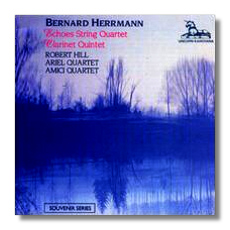
The Internet's Premier Classical Music Source
Related Links
- Herrmann Reviews
- Latest Reviews
- More Reviews
-
By Composer
-
Collections
DVD & Blu-ray
Books
Concert Reviews
Articles/Interviews
Software
Audio
Search Amazon
Recommended Links
Site News
 CD Review
CD Review
Bernard Herrmann

Chamber Music
- Clarinet Quintet "Souvenirs de Voyage"
- String Quartet "Echoes"
Robert Hill, clarinet
Ariel Quartet
Amici Quartet
Unicorn-Kanchana UKCD2069
People know Bernard Herrmann best as a film composer, most likely as the creator of the string-orchestra shrieks in Hitchcock's Psycho. Herrmann had a long Hollywood career, stretching from the 1940s (Citizen Kane) to a never-used score for Torn Curtain. The last occasioned a fiery split with Hitchcock. Herrmann had refused to score the picture in the manner of Three Coins in the Fountain, as the director had wanted, and it appeared as if Herrmann would never take a meeting in Hollywood again. He decided to return to a conducting and composing career (as opposed to a film conducting and composing career), and moved his home base to London.
Herrmann's concert works come from those times when he wasn't going full-blast at films – the 30s, early 40s, and the 60s through the early 70s, when the young Turks of France and Hollywood, notably Truffaut, De Palma, and Scorcese, fortunately brought him back. For me, however, Herrmann becomes fully energized only as a film composer. The concert music, with very rare exceptions, doesn't present a strong, inevitable musical argument, as do such film composers as Walton, Prokofieff, Honegger, Milhaud, Waxman, and Rózsa. Herrmann's music excels at creating moods, rather than at generating a strong "narrative" impulse.
A couple of things strike me at once. First, the idiom of Herrmann's concert music doesn't differ an awful lot from the film music. Second, the gentility, the unabashed Romanticism, unleavened by ironic distance, of the concert music seems at odds with the breathtaking imagination of the film music. This is truer of the Clarinet Quintet than the String Quartet. Parts of the quintet could have come right out of The Ghost and Mrs. Muir and Vertigo. The resemblance will amaze. Nevertheless, the Romanticism of the film scores is either appropriate to the images and story (as in The Ghost and Mrs. Muir) or the film story puts a perverse spin on the Romanticism of the music (as in Vertigo). Third, is it really a coincidence that both Vertigo and The Ghost and Mrs. Muir concern impossible loves? If not, what does the quintet music have to do with Herrmann's avowed program – "On Wenlock Edge" in the first movement, the Aran Islands in the second, and Venice in the third? None of the music strikes me as particularly relevant to any of these locations, and this is oddest of all, since Herrmann made his living as a master of apt. I strongly feel something else going on. Nevertheless, the music, although passionate, doesn't quite hold together, nor does it keep interest and forward impulse throughout its slightly more than 25 minutes. Robert Hill and the Ariel exacerbate the problems of coherence by dragging tempi (almost 30 minutes for the entire work) and with a flat clarinet in the first movement. I prefer my current favorite clarinettist, David Shifrin, and Chamber Music Northwest, who clock in at slightly under 27 minutes and convey more fervor (Delos DE 3088).
The String Quartet "Echoes" comes across as one of Herrmann's most successful works. As we've come to expect from Herrmann, the quartet presents no tight argument or motific development – ten musically- unrelated ideas held together by material from the quartet's prologue. Nevertheless, Herrmann shapes the music to his strengths – an edgy moodiness, a variety of interesting ideas, and great diversity of texture within the "black-and-white" string quartet. One of the sections, a habanera, strongly recalls the theme associated with Kim Novak as the unattainable love object of Vertigo. Quintet and quartet appeared about a year apart. I don't know enough of Herrmann's personal life at this time, but the work really does seem the record of an abortive affair. The Amici Quartet catch the self-gnawing nerve and sudden, macabre explosions of the work. This is music from the psychoanalyst's couch – probing, worrying, obsessive, self-reproachful. Under the Amici, the music becomes less scattered than you'd expect from analyzing the score. The "flaws" become simply another way to compose. The performance strongly champions the composer and invites the listener to communicate with a rare artistic sensibility.
Copyright © 1996, Steve Schwartz


















